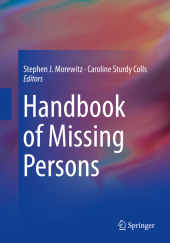 Neuerscheinungen 2018Stand: 2020-02-01 |
Schnellsuche
ISBN/Stichwort/Autor
|
Herderstra▀e 10
10625 Berlin
Tel.: 030 315 714 16
Fax 030 315 714 14
info@buchspektrum.de |

Stephen J. Morewitz, Caroline Sturdy Colls
(Beteiligte)
Handbook of Missing Persons
Herausgegeben von Morewitz, Stephen J.; Sturdy Colls, Caroline
1st ed. 2016. 2018. xxiv, 585 S. 15 SW-Abb., 76 Farbabb. 254 mm
Verlag/Jahr: SPRINGER, BERLIN; SPRINGER INTERNATIONAL PUBLISHING 2018
ISBN: 3-319-92883-X (331992883X)
Neue ISBN: 978-3-319-92883-8 (9783319928838)
Preis und Lieferzeit: Bitte klicken
This ambitious multidisciplinary volume surveys the science, forensics, politics, and ethics involved in responding to missing persons cases. International experts across the physical and social sciences offer data, case examples, and insights on best practices, new methods, and emerging specialties that may be employed in investigations. Topics such as secondary victimization, privacy issues, DNA identification, and the challenges of finding victims of war and genocide highlight the uncertainties and complexities surrounding these cases as well as possibilities for location and recovery. This diverse presentation will assist professionals in accessing new ideas, collaborating with colleagues, and handling missing persons cases with greater efficiency-and potentially greater certainty.
Among the Handbook ┤s topics:
˙A profile of missing persons: some key findings for police officers.
˙Missing persons investigations and identification: issues of scale, infrastructure, and political will.
˙Pregnancy and parenting among runaway and homeless young women.
˙Estimating the appearance of the missing: forensic age progression in the search for missing persons.
˙The use of trace evidence in missing persons investigations.
˙The Investigation of historic missing persons cases: genocide and "conflict time" human rights abuses.
The depth and scope of its expertise make the Handbook of Missing Persons useful for criminal justice and forensic professionals, health care and mental health professionals, social scientists, legal professionals, policy leaders, community leaders, and military personnel, as well as for the general public.
Missing Persons: An Introduction.- A Profile of Missing Persons: Some Key Findings for Police Officers.- Missing Persons Appeals: A UK Perspective.- The Rhetoric and Reality of AMBER Alert: Empirical and Public Discourse Considerations Regarding the Child Abduction Phenomenon.- Secondary Victimization in Missing Children Events.- Conduct Problems among Runaway and Homeless Teens.- Pregnancy and Parenting among Runaway and Homeless Young Women.- Missing Persons: Forensic Sociology Factors.- Missing Someone: Exploring the Experiences Of Family Members.- Geographies of Missing People: Improving Police Knowledge and Response to Missing Persons.- Prospective Person Memory in the Search for Missing Persons.- Ethical Challenges in Missing Persons Investigations.- Forensic Genetics Against Children Trafficking: Missing Children Genetic Identification.- Missing Persons Investigations and Identification: Issues of Scale, Infrastructure, and Political Will.- Missing Persons in Croatia: Incidence, Characteristics and Police Performance Effectiveness.- Investigation of Long-Time Missing Persons as Cold Case Homicides: An American Perspective.- Estimating the Appearance of the Missing: Forensic Age Progression in the Search for Missing Persons.- The Role of Forensic Archaeology in Missing Persons Investigations.- The Use of Dogs in Missing Persons Investigations.- Advances in Forensic Entomology in Missing Persons Investigations.- Forensic Palynology and Environmental Profiling in Missing Persons Investigations.- DNA methods to identify missing persons.- Trace DNA profiling in missing persons investigations.- The Advantages of Non-Criminal Genetic Databases in Identifying Missing Persons and Human Remains.- Privacy Challenges with Genetic Information.- Fingerprints.- Forensic Anthropology and Missing Persons Investigations.- Forensic facial reconstruction and its contribution to identification in ┤missing person┤ cases.- Stable Isotope Forensics as an Investigative Tool in Missing Persons Investigations.- The Use of Trace Evidence in Missing Persons Investigations.- Mass Grave Investigation and Identifying Missing Persons: Challenges and Innovations In Archaeology And Anthropology In The Context Of Mass Death Environments.- Evolution of DVI/DVM - an overview of management and pitfalls.- Evaluating the Role of Forensic Anthropologists in Human Rights Investigations of Missing Persons.- The Investigation of Historic Missing Persons Cases - Genocide and ┤Conflict Time┤ Human Rights Abuses.


